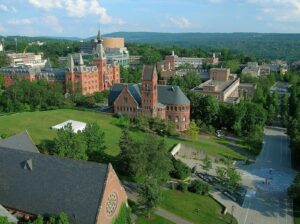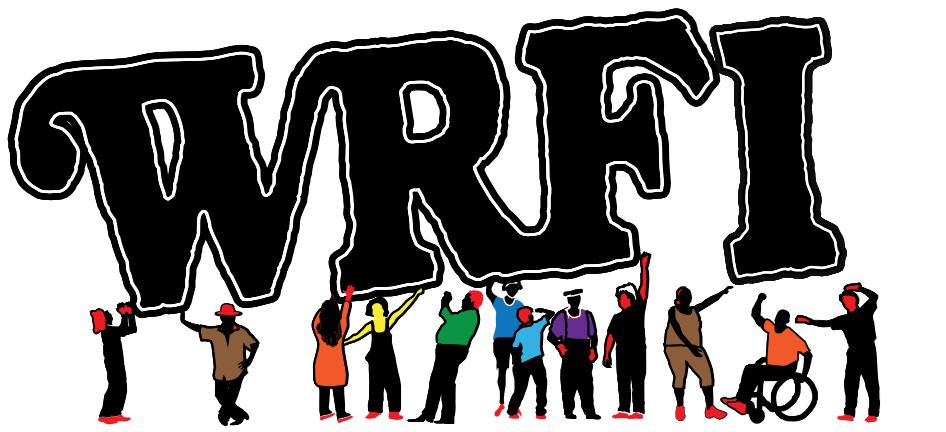LISTEN: Freedom of Expression at Cornell
Cornell’s academic theme this school year is freedom of expression. It was meant to be a year of celebration of one of the university’s core values. Instead how freedom of expression is practiced or protected on campus has become a divisive issue.
The theme was announced last April months before war broke out between Israel and Hamas. Over the next few weeks, WRFI will report on the state of freedom of expression on the campus. This week we’re sharing an overview of some events shaping Cornell’s year of freedom of expression.
Cornell declined our request to interview someone from the administration about this year’s theme and the state of freedom of expression on campus.

Cornell University from atop McGraw Tower looking southeast; Barnes Hall, Sage Hall
(flickr: sach1tb, 2006)
Student protests are nothing new at Cornell.
"So there's a very long tradition of student protests at Cornell is that into university and to a large extent that has been celebrated here. I mean, for example the Willard straight takeover of the late 1960s," said Tracy McNulty, a professor of comparative literature at Cornell.
At Cornell, like at many schools, campus protests take different forms from shouting down invited speakers and occupying buildings to candlelight vigils and “die-ins”.
October was a tumultuous month on campus. University President Martha Pollack’s initial statement of support for Israel was criticized for not mentioning what was happening in Gaza.
Days later she was criticized again for a different statement that condemned remarks made off-campus about the war by Professor Russell Rickford. Over a hundred faculty members signed a petition supporting Rickford and his free speech rights. The situation drew national media attention, calls that he be fired, and death threats. Pro-Israel and Pro-Palestine rallies continued on campus. McNulty says she and others have experienced some intimidating behaviors. She says it’s because they attended rallies in support of Palestine.
"I certainly have a lot of colleagues who have been doxxed you know, specifically for speaking out on these kinds of issues and speaking out critically against the war. You know, they've appeared all over Fox News. They've been doxxed by students. They've had angry protesters come to their house. They've been followed home, photographed all the way home," she said.
Pollack has often spoken about learning from offensive or disagreeable ideas.
"As a university, we believe it's our responsibility to ensure that our students are exposed even to ideas that challenge them, even to ideas they find offensive or wrong, because being exposed to ideas that one disagrees with is a core part of university education," she said.
But, offensive speech isn’t the same as hate speech. Sometimes the line between the two can seem subjective.
Legally, not everything is considered “protected speech”.
"Speech is protected unless it falls into one of these categories of unprotected speech among one of them is a true threat, which when a speaker directs to a person, that specific group of people, the intent of placing them for fear of bodily harm or death has to be a serious intent to commit the violence," said Zach Greenberg is an attorney with the Foundation for Individual Rights and Expression (FIRE).
Nationally, 73% of Jewish college students say they have experienced or witnessed antisemitic acts since the beginning of this school year. That’s according to a study by the Anti-Defamation League’s Center for Antisemitism Research. The Council on American-Islamic Relations, CAIR says reports of anti-Muslim and anti-Arab incidents grew significantly after October 7.
At the end of October, Cornell undergraduate student, Patrick Dai, was arrested on federal charges after an FBI investigation. He is accused of allegedly posting violent anti-semitic threats to an online forum. The posts made specific threats to attack the Center for Jewish Life on campus and Jewish people at Cornell. The university administration and Governor Kathy Hochul immediately condemned the threats. On Nov. 1, Pollack issued a statement condemning “antisemitism and all forms of hate.”
The right to freedom of speech protected by the Constitution isn’t guaranteed at private institutions like Cornell.
"Cornell is a private institution for the most part, it's not bound by the First Amendment, but it is bound by the promise that makes to students and in His promises. It has very strong robust free speech commitments consistent with the First Amendment so any student that goes to Cornell will reasonably believe that reading these policies their speech we protected as if it was a public school bound by the First Amendment," said Greenberg of FIRE.
At least one student was suspended this semester because of what she wrote in a social media post. Both FIRE and the New York Civil Liberties Union say unlike the threatening posts made by Dai, what this student wrote does not violate university policies or any laws. There will be more about her case later in this series.
In January, Cornell issued an “Interim Expressive Activity Policy.” Pollack says it consolidates existing policies and makes minor changes. Parts of the new policy have been overwhelmingly criticized in the university’s own online feedback forum, at town hall discussions for students, staff, and faculty, and in op-eds in the campus newspaper. Critics say it will stifle speech speech. They say the new policy puts limits on when, where, and how Cornellians can protest. Students who violate the new measures would face disciplinary action from the Office of Student Conduct.
McNulty says the policy is already affecting who will speak out.
"Many of the graduate students in particular, who are organizing on behalf of Palestinians or simply protesting the war, are themselves international students. You know, so they're here on foreign visas. They're very concerned about potentially losing their visa. Some of these students are Palestinian and therefore stateless. So, you know, they face you know, extra threats and engaging in political activity," she said.
What’s going on at Cornell isn’t happening in a bubble. In December, the presidents of Harvard, University of Pennsylvania, and MIT were called before a congressional committee and grilled about anti-semitism on their campuses.
Risa Lieberwitz is a professor in Cornell’s School of Industrial and Labor Relations, a member of the faculty senate, and president of the campus chapter of the American Association of University Professors.
"Given the nature of politics in the United States right now, and the congressional attempts to interfere with free expression on campus, there is, I think, a palpable sense of a chill on campus around speech and around demonstrations. Now, those are still taking place. But there is concern of by students and faculty and staff of being targeted for some sort of retaliation," she said.
Over the next few weeks students and faculty will share their thoughts about the state of freedom of expression at Cornell.
